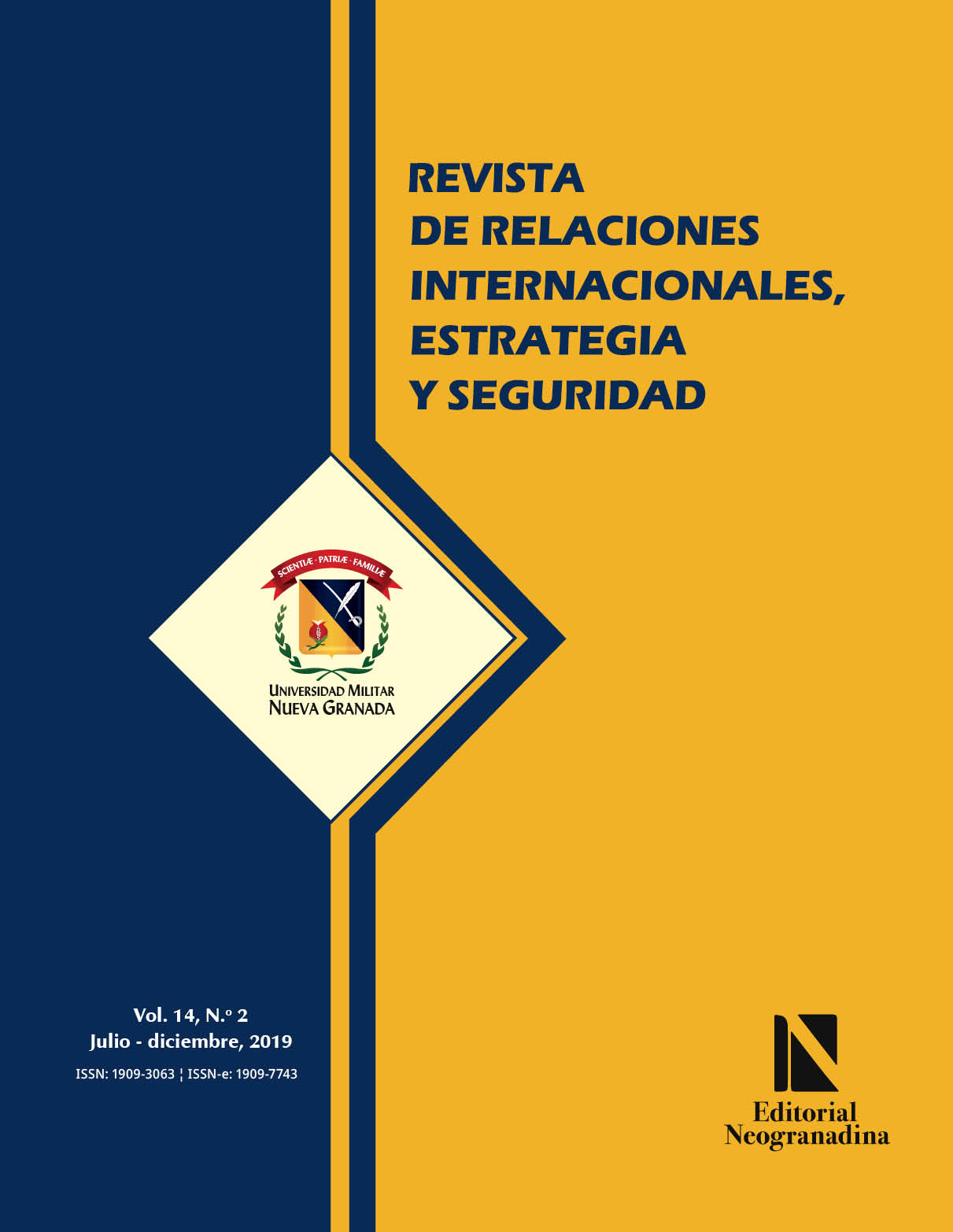Latin America at a Crossroads: A Cultural Theory to Address the Wicked Problem of Regional Integration with Clumsy Solutions
Abstract
Latin America is at a crossroads. Its efforts to integrate are undergoing significant changes. In this light, integration has been regarded as a wicked problem. Contra convention, such approach suggests that wicked problems, being social problems, may have an indefinite number of solutions. This article builds on that argument and, in order to make it workable, proposes gridgroup cultural theory as a framework to reduce its complexity while taking its inherent pluralityseriously. In brief, this theory focuses on how individual decision-making is influenced by the collective (group) or by institutions (grid). The combination of these two dimensions provides four rationalities, ways of life, or worldviews: hierarchy, individualism, egalitarianism, and fatalism. Latin American integration initiatives can be found within this limited diversity scheme to address this wicked problem and hint at appropriate solutions, clumsy ones. They require the inclusion of all rationalities in constructive dialogue seeking not to leave them worse off.
Downloads
References
ALADI. (2018). Quienes somos. Retrieved from http://www.aladi.org/sitioAladi/quienesSomos.html
Aphelthaler, G. & Domicone, H. (2008). Drawing wrong borderlines: the concept of culture in a pluralist management world. Problems and Perspective in Management, 6(2), 44-58
Arenas-García, N. (2012). 21st Century Regionalism in South America: UNASUR and the Search for Development Alternatives, eSharp, 18: 64-85
Balassa, B. (1961a). The Theory of Economic Integration. Abingdon, UK: Routledge
Balassa, B. (1961b). Towards a Theory of Economic Integration. Kyklos International Review for Social Sciences, 14(1), 1-17
Bell, W. (1997). An Anthropological View of How Organizations Think. Working Paper 16/97. Monash University Faculty of Business & Economics.
Bernal-Meza, R. (2013). Modelos o esquemas de integración y cooperación en curso en América Latina (UNASUR, Alianza del Pacífico, ALBA, CELAC) una vista panorámica. Berlin: Ibero-Amerikanisches Institut
CAN. (1969). Andean Subregional Integration Agreement, Cartagena Agreement
CAN. (2018). Sistem Andino de Integración. Retrieved from: http://www.comunidadandina.org/Seccion.aspx?tipo=QU
CAN- General Secretariat. (2009). 40 años de integración andina: Avances y Perspectivas. Revista de la Integración, núm. 4.
CEPAL. (2012). 30 años de integración comercial en la ALADI. Montevideo: ALADI
Couriel, A. y Moreira, C. (2013) UNASUR: La unidad de América Latina para la cooperación y la integración. In C. Silva & C. Martins (2013), Nuevos Escenarios para la Integración de América Latina (pp. 303-324), Buenos Aires: CLACSO, Grupo de Trabajo Integración Regional y Unión Latinoamericana.
Coyle, D. (1994). The Theory That Would Be King. In Coyle, Dennis and Richard Ellis (eds). Politics, Policy, and Culture (pp: 219-239). Boulder, CO: Westview Press
Douglas, M. (1982). In the Acting Voice. Boston, US: Routledge & Kegan Paul
Espinosa, E. (2013). ALBA: Teoría y práctica de la integración regional. Una visión desde el Sur. In C. Silva & C. Martins (2013), Nuevos Escenarios para la Integración de América Latina (pp. 273-302), Buenos Aires: CLACSO, Grupo de Trabajo Integración Regional y Unión Latinoamericana.
Freeden, M. (1996). Ideologies and Political Theory: A Conceptual Approach, Clarendon: Oxford University Press.
Garcés, P. (2015). Organization, power and leadership: a cultural approach. Revista PUCE, 101, 89-110
Garcés, P. (2018). Latin American integration as a wicked problem: the case for a plural approach, Revista de Relaciones Internacionales, Estrategia y Seguridad, 13(1), 93-117
Hollis, M. (1994). The Philosophy of Social Science: an introduction. Cambridge University Press, Cambridge, UK
Hollis, M & Smith, S. (1990). Explaining and Understanding International Relations. Oxford: Clarendon Press.
Hood, C. (1998). The Art of the State: Culture, Rhetoric and Public Management. Oxford, UK: Oxford University Press
Lockhart, C. (1998). The Social Construction of Cooperation: Egalitarian, Hierarchical, and Individualistic Faces of Altruism. In S-K. Chai & B. Swedlow (eds). Culture and Social Theory / Aaron Wildavsky (pp: 113-131). London, UK: Transaction Publishers
MERCOSUR. (1991). Treaty Establishing a Common Market between the Argentine Republic, the Federal Republic of Brazil, the Republic of Paraguay and the Eastern Republic of Uruguay, Treaty of Asunción
MERCOSUR. (2016). Mercosur: Structure and Agendas. Retrieved from http://www.mercosur.int/innovaportal/v/7481/10/innova.front/what-is-mercosur-_-mercosul
Nye, J. & Welch, D. (2014). Understanding Global Conflict and Cooperation: Into to theory and history, ninth edition. Essex, UK: Pearson Education Limited
Preciado, J. & Florido, A. (2013). La Comunidad de Estados Latinoamericanos y Caribeños (CELAC); integración “postneoliberal”, neoliberal ortodoxa y contrahegemónica. In C. Silva & C. Martins (2013), Nuevos Escenarios para la Integración de América Latina (pp. 187-214), Buenos Aires: CLACSO, Grupo de Trabajo Integración Regional y Unión Latinoamericana.
Quijano, J. (2011). El MERCOSUR 20 años después. In Caetano, G (Ed.), Mercosur 20 años ( pp. 89-127) Montevideo, Uruguay: Centro de formación para la integración regional, FES, GIZ, Somos Mercosur
Regueiro, L. & Barzaga, M. (2012). Unasur: proceso y propuesta. Quito, Ecuador: Fedaeps
SELA. (2014). Evolución del Sistema de Integración Centroamericano (SICA)
SICA. (2018). Corte Centroamericana de justicia. Retrieved from: https://www.sica.int/consulta/entidades.aspx?IdEnt=432&Indv=2&IdmStyle=1&Idm=1
Thompson, M. et al. (1990). Cultural Theory. Oxford et al: Westview Press.
Thompson, M. (2003). Cultural Theory, Climate Change and Clumsiness. Economic and Political Weekly, 38(48), 5107-5112.
Thompson, M. & Ellis, R. (1998). Introduction: Political Cultures. In Chai, Sun-Ki and Brendon Swedlow (eds). Culture and Social Theory / Aaron Wildavsky (pp: 1-13). London, UK: Transaction Publishers
Valdez, J. (2013) CELAC: expectativas y realidades. In A. Bonilla & M. Ortiz. (Eds.) De Madrid a Santiago: Retos y Oportunidades (pp: 219-222), Quito, Ecuador: Flacso
Verweii, M. & Thompson, M. (eds). (1998). Clumsy Solutions for a Complex World. Hampshire, UK: Palgrave
Verweij, M. et al. (2006). Clumsy Solutions for a complex world: the case of climate change. Public Administration, 84(4), 817-843
Verweij, M. (2011). Clumsy Solutions for a Wicked World: how to improve global governance. Palgrave Macmillan
Weber, M. (1947). The Theory of Social and Economic Organization. New York, US: Oxford University Press












